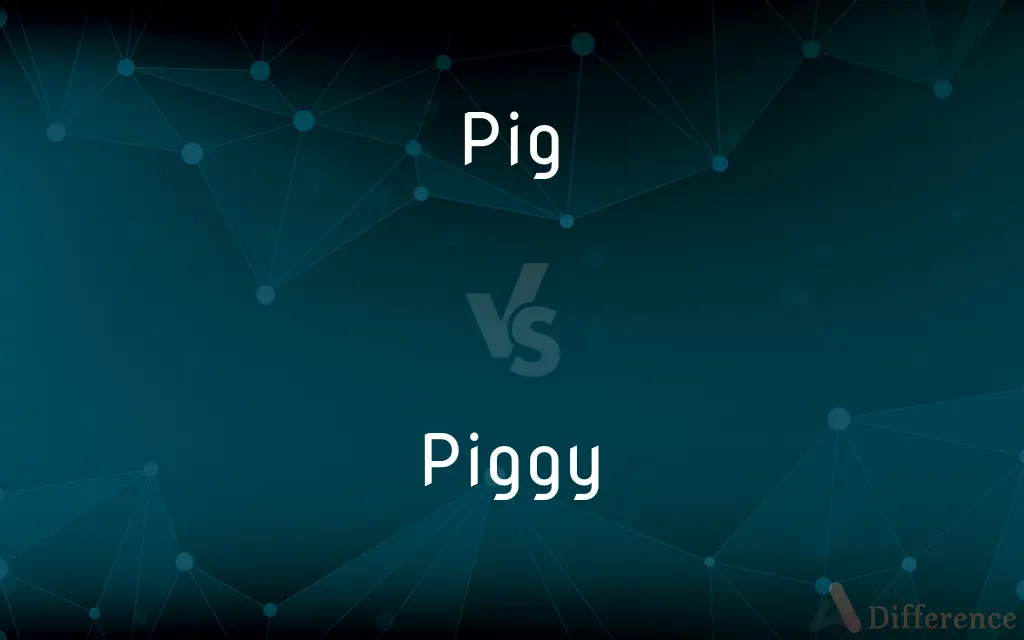Pig vs. Piggy — What's the Difference?
By Tayyaba Rehman & Urooj Arif — Updated on April 21, 2024
"Pig" refers to the animal belonging to the species Sus scrofa, commonly raised as livestock, while "piggy" is an affectionate or diminutive term for a small pig or used metaphorically for someone perceived as greedy.

Difference Between Pig and Piggy
Table of Contents
ADVERTISEMENT
Key Differences
"Pig" typically refers to a domestic or wild animal known scientifically as Sus scrofa, which is widely farmed for its meat, such as pork, bacon, and ham. On the other hand, "piggy" is often used to describe a small pig, especially in contexts meant to be endearing or cute.
In literature and common usage, "pig" is a straightforward term without inherent emotional connotation, used to identify the species in both farming and wildlife contexts. Whereas "piggy" carries a softer, more playful tone, often used in children’s books, pet names, and light-hearted speech.
Financially, "pig" refers to the animal as an economic resource in agricultural industries, important for both meat production and in some cultures, as part of ceremonial or traditional practices. Conversely, "piggy" can metaphorically refer to someone who is greedy or gluttonous, as in "piggy eater," or to a piggy bank, which symbolizes saving money.
The physical description of a "pig" can vary widely, encompassing a range of breeds and sizes typically seen in both wild and domestic settings. On the other hand, "piggy" implies a smaller, perhaps younger or cuter version of a pig, often depicted with exaggerated features like a rounder body or bigger eyes in cartoons and illustrations.
In terms of behavior, "pig" does not imply any particular trait beyond those natural to the species, such as foraging or mud-bathing. However, "piggy" might be used in a playful way to describe behaviors considered cute or endearing, such as a piglet snuggling with its siblings.
ADVERTISEMENT
Comparison Table
Comparison Chart
Definition
A domesticated or wild animal, Sus scrofa.
A diminutive or affectionate term for a pig.
Connotation
Neutral, agricultural, wild.
Endearing, cute, sometimes metaphorical.
Usage in Context
Farming, culinary, wildlife.
Children's literature, playful language.
Metaphorical Use
Rarely used metaphorically.
Often used to denote greed or saving money.
Typical Image
Varied breeds, sizes, typically realistic.
Smaller, cuter, often stylized in media.
Compare with Definitions
Pig
A large domesticated farm animal raised for its meat.
The farmer raised pigs primarily for selling pork.
Piggy
Used in playful contexts to denote something small or endearing.
She gave a piggy snort of laughter.
Pig
A derogatory term used to describe a filthy or greedy person.
He was called a pig for his messy habits.
Piggy
Used metaphorically for someone who is greedy.
He's such a piggy when it comes to dessert.
Pig
Used scientifically to refer to the species Sus scrofa.
The study focused on the behavior of pigs in different farming environments.
Piggy
A small or young pig, often depicted as cute.
The children loved the piggy in the petting zoo.
Pig
A wild animal of the same species as the domestic pig, found in forests.
Wild pigs can be quite destructive to natural habitats.
Piggy
A term of endearment for pigs in stories or pet names.
She named her pet piggy Snuffles.
Pig
An omnivorous animal known for its robust body and snout.
Pigs are often seen rooting around in the mud with their snouts.
Piggy
Referring to a piggy bank, a container for saving coins.
Her piggy bank was almost full of coins.
Pig
A pig is any of the animals in the genus Sus, within the even-toed ungulate family Suidae. Pigs include domestic pigs and their ancestor, the common Eurasian wild boar (Sus scrofa), along with other species.
Piggy
A little pig.
Pig
An omnivorous domesticated hoofed mammal with sparse bristly hair and a flat snout for rooting in the soil, kept for its meat.
Piggy
Piggish.
Pig
A greedy, dirty, or unpleasant person
I bet he's scoffed them all, greedy pig
Piggy
(hypocoristic) A pig the animal.
This little piggy went to market.
Pig
A police officer
Were the pigs there when the windows were smashed or not?
Piggy
(hypocoristic) A guinea pig.
Pig
An oblong mass of iron or lead from a smelting furnace.
Piggy
A toe.
He has such cute piggies!
Pig
A device which fits snugly inside an oil or gas pipeline and is sent through it to clean or test the inside, or to act as a barrier.
Piggy
A pig, a greedy person.
Can't you finish your dinner? You've been a piggy, haven't you?
Pig
Gorge oneself with food
Lovesick people pig out on chocolate
Piggy
A member of the police.
Pig
Crowd together with other people in disorderly or dirty conditions
He didn't approve of the proposal to pig it in the studio
Piggy
Greedy
Pig
(of a sow) give birth to piglets; farrow.
Piggy
Slovenly, dirty
Pig
Operate a pig within an oil or gas pipeline
They will carry out all trenching and pigging
Piggy
A young pig
Pig
Any of various mammals of the family Suidae, having short legs, hooves with two weight-bearing toes, bristly hair, and a cartilaginous snout used for digging, including the domesticated hog (Sus scrofa subsp. domestica syn. S. domesticus) and wild species such as the bushpig.
Piggy
Resembling swine; coarsely gluttonous or greedy;
Piggish table manners
The piggy fat-cheeked little boy and his porcine pot-bellied father
Swinish slavering over food
Pig
A domesticated hog, especially when weighing less than 54 kilograms (120 pounds).
Pig
The edible parts of one of these mammals.
Pig
(Informal) A person regarded as being piglike, greedy, or disgusting.
Pig
Derogatory Slang A police officer.
Pig
A crude block of metal, chiefly iron or lead, poured from a smelting furnace.
Pig
A mold in which such metal is cast.
Pig
Pig iron.
Pig
To give birth to pigs; farrow.
Pig
Any of several mammalian species of the genus Sus, having cloven hooves, bristles and a nose adapted for digging; especially the domesticated animal Sus domesticus.
The man kept a pen with two pigs that he fed everything from carrots to cabbage.
Pig
(uncountable) The edible meat of such an animal; pork.
Some religions prohibit their adherents from eating pig.
Pig
(uncountable) A light pinkish-red colour, like that of a pig (also called pig pink).
Pig
Someone who overeats or eats rapidly and noisily.
You gluttonous pig! Now that you've eaten all the cupcakes, there will be none for the party!
Pig
A dirty or slovenly person.
He was a pig and his apartment a pigpen; take-away containers and pizza boxes in a long, moldy stream lined his counter tops.
Pig
(derogatory) A very obese person.
Pig
A police officer.
The protester shouted, “Don't give in to the pigs!” as he was arrested.
Pig
(informal) A difficult problem.
Hrm... this one's a real pig: I've been banging my head against the wall over it for hours!
Pig
A block of cast metal.
The conveyor carried the pigs from the smelter to the freight cars.
After the ill-advised trade, the investor was stuck with worthless options for 10,000 tons of iron pig.
Pig
The mold in which a block of metal is cast.
The pig was cracked, and molten metal was oozing from the side.
Pig
A lead container used for radioactive waste.
Pig
(engineering) A device for cleaning or inspecting the inside of an oil or gas pipeline, or for separating different substances within the pipeline. Named for the pig-like squealing noise made by their progress.
Unfortunately, the pig sent to clear the obstruction got lodged in a tight bend, adding to the problem.
Pig
The general-purpose M60 machine gun, considered to be heavy and bulky.
Unfortunately, the M60 is about twenty-four pounds and is very unbalanced. You try carrying the pig around the jungle and see how you feel.
Pig
(uncountable) A simple dice game in which players roll the dice as many times as they like, either accumulating a greater score or losing previous points gained.
Pig
A sixpence.
Pig
(Scottish) earthenware, or an earthenware shard
Pig
An earthenware hot-water jar to warm a bed; a stone bed warmer
Pig
(of swine) to give birth.
The black sow pigged at seven this morning.
Pig
(intransitive) To greedily consume (especially food).
They were pigging on the free food at the bar.
Pig
(intransitive) To huddle or lie together like pigs, in one bed.
Pig
(intransitive) To live together in a crowded filthy manner.
Pig
To clean (a pipeline) using a pig the device.
Pig
A piggin.
Pig
The young of swine, male or female; also, any swine; a hog.
Pig
Any wild species of the genus Sus and related genera.
Pig
An oblong mass of cast iron, lead, or other metal. See Mine pig, under Mine.
Pig
One who is hoggish; a greedy person.
Pig
To bring forth (pigs); to bring forth in the manner of pigs; to farrow.
Pig
To huddle or lie together like pigs, in one bed.
Pig
Domestic swine
Pig
A coarse obnoxious person
Pig
A person regarded as greedy and pig-like
Pig
Uncomplimentary terms for a policeman
Pig
Mold consisting of a bed of sand in which pig iron is cast
Pig
A crude block of metal (lead or iron) poured from a smelting furnace
Pig
Live like a pig, in squalor
Pig
Eat greedily;
He devoured three sandwiches
Pig
Give birth;
Sows farrow
Common Curiosities
How does the lifespan of a pig compare to that of other farm animals?
Pigs typically live longer than poultry but have shorter lifespans compared to cattle, with a lifespan ranging between 6 to 10 years depending on their breed and living conditions.
How are pigs depicted in popular culture?
Pigs are often portrayed in various ways in popular culture, ranging from the clever and cunning pigs in "Animal Farm" to the adorable and friendly Piglet in "Winnie the Pooh."
Why are pigs considered important in agriculture?
Pigs are valued in agriculture for their ability to efficiently convert feed into body mass, making them an excellent source of meat and other products like leather.
What is involved in the process of pig farming?
Pig farming involves breeding, raising, and managing pigs for meat production, which includes ensuring proper nutrition, health care, and living conditions to maximize growth and productivity.
What are the challenges of pig farming?
Challenges include managing diseases, maintaining environmental standards, ensuring ethical treatment, and handling market fluctuations in pork prices.
What role do pigs play in medical research?
Pigs are used in medical research due to their physiological similarities to humans, contributing to studies in organ transplantation, pharmacology, and various disease models.
What are some common misconceptions about pigs?
A common misconception is that pigs are inherently dirty animals; however, their mud-bathing is actually a way to cool down and protect their skin.
Is there a cultural significance to pigs in certain societies?
Yes, in many cultures, pigs have significant economic and symbolic roles, from being a staple food source to featuring in religious ceremonies and folklore.
What are the economic benefits of raising pigs?
Economically, pigs are beneficial due to their rapid growth, efficient feed conversion, and the high demand for pork products in the market.
What kind of environments do pigs live in?
Domestic pigs are usually kept in pens on farms, while wild pigs can thrive in a variety of environments, from forests to grasslands.
How do the behaviors of domestic pigs differ from wild pigs?
Domestic pigs are generally more docile and dependent on human care, whereas wild pigs are more aggressive, independent, and have to forage for their own food.
Are pigs intelligent animals?
Yes, pigs are considered highly intelligent, capable of learning complex tasks, solving problems, and even playing video games designed for cognitive testing.
What are the dietary needs of a pig?
Pigs are omnivores and have a diet that includes grains, vegetables, and occasionally animal proteins, which helps them grow and maintain health.
How has pig farming changed with modern agriculture practices?
Modern pig farming has become more intensive, with advances in genetics, nutrition, and farm management practices improving efficiency and productivity.
How do pigs communicate with each other?
Pigs communicate through a variety of sounds, body language, and even odor cues, with different grunts and squeals indicating their emotional states or intentions.
Share Your Discovery

Previous Comparison
Pillar vs. Pier
Next Comparison
Explanatory vs. ExplicatoryAuthor Spotlight
Written by
Tayyaba RehmanTayyaba Rehman is a distinguished writer, currently serving as a primary contributor to askdifference.com. As a researcher in semantics and etymology, Tayyaba's passion for the complexity of languages and their distinctions has found a perfect home on the platform. Tayyaba delves into the intricacies of language, distinguishing between commonly confused words and phrases, thereby providing clarity for readers worldwide.
Co-written by
Urooj ArifUrooj is a skilled content writer at Ask Difference, known for her exceptional ability to simplify complex topics into engaging and informative content. With a passion for research and a flair for clear, concise writing, she consistently delivers articles that resonate with our diverse audience.












































